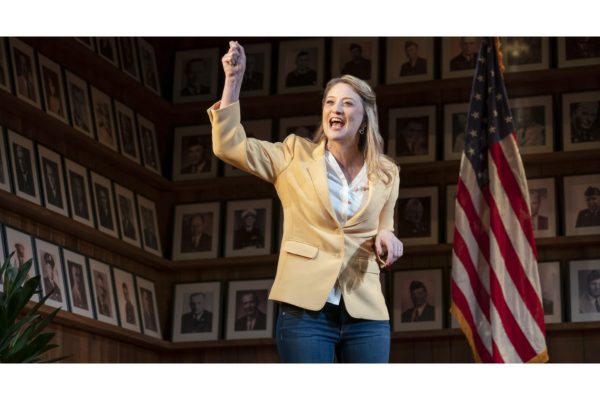apologia: (noun) a formal written defense of one’s opinion; a vindication, justification, or explanation
Roundabout Theatre Company‘s latest Off-Broadway play, Apologia, by Alexi Kaye Campbell, opened at the Laura Pels Theatre earlier this month. The play stars Stockard Channing and Hugh Dancy, two beloved actors of stage and screen. But this play is no simple piece – it requires an apologia, an explanation.
The play tells the story of Kristin Miller, a famous art historian who has written a memoir about her career and time as a political rebel during the 1960s. However, she seems to have forgotten to include either of her sons in the book. Her sons both show up, with their significant others (both of whom Kristin doesn’t like), and unsurprisingly, tensions mount. The play slowly builds tension until it erupts into a massive feud about ethics and motherhood.
At the center of the yelling is Channing as Kristin, the problematic matriarch. Her memoir, which is titled “Apologia,” is, as she states, “not an apology.” Throughout her life, Kristin has put her career first. When her ex-husband took her sons away, she did not chase after them but stayed in Florence doing research. Her sons, Simon and Peter (both played by Dancy), refuse to forget and are still deeply hurt by the lack of maternal affection. Kristin sees nothing wrong with the way that she raised her boys, and is proud of the work that she has done in art history.
Without a doubt, Kristin is one of the more complicated female characters written for the stage. Alison Bechdel (of FUN HOME) inspired the Bechdel Test, which judges how developed female characters are in a play, movie, novel, or television show. Recently, another show from Roundabout Theatre Company proposed a modified version of the Bechdel Test, which I call the Bernhardt Test. In the new play BERNHARDT/HAMLET by Theresa Rebeck, legendary actress Sarah Bernhardt goes on a rant about the roles that are offered to her:

“I will not go back to playing flowers. Not because I am too old, but because I was never a flower, and no matter how much you loved how beautifully I might play the ingénue, it was always beneath me. It is beneath all women.”
Her point is incredibly powerful: simplistic, romantic, empty female characters – the love interest, the girlfriend, the damsel in distress – are sexist and women should not be forced to play them.

Bernhardt (played by the equally iconic Janet McTeer) demanded better roles for women, roles that were difficult and complicated. Thankfully, this season is taking up the call, and in addition to McTeer and Channing, there are productions featuring Glenn Close, Laurie Metcalf, Andrea Martin, Annette Benning, Elaine May, and many other powerful women.
These legendary actresses all have complicated female characters, none are playing ingénues that are only in the play to be a romantic interest for a male character. They are mothers, politicians, hard-working employees, they are not damsels in distress; they refuse to be.
Without a doubt, Apologia playwright Alexi Kaye Campbell answered this call for no more ingénues.
Channing has played the ingénue, and like Bernhardt, she deserves better. In Apologia, she was is given something much better: her character, Kristin, is complex, flawed, and full of nuance. She is emotional, confident, strong-willed, and intelligent. She is maternal, but not ashamed of her sexual past. She is intensely critical of others, but defensive about her own choices.
Unlike the ingénues that Bernhardt rants about, she certainly has a lot to say, is nowhere near the “ideal woman” stereotype, and cannot be summed up in a few words. She is multifaceted. She is a challenge for Channing. She passes the Bernhard Test.
In a world filled with misogyny, violence against women, unequal wages, and politicians mocking the #MeToo movement, women’s voices need to be heard, need to be prioritized. Theater has often been a part of the problem, only providing women with overly simplistic, stereotypical female roles to play. Now, more than ever, it is crucial to create complicated roles for women, something Apologia does perfectly.
Not only is Kristin a difficult, unique female character, but the other women of the play are also distinctive. Trudi, Peter’s girlfriend – played by Talene Monahon – is an American, Christian, vegetarian, who is not particularly smart, but is deeply passionate, thoughtful, and kind. Claire, Simon’s girlfriend – played by Megalyn Echikunwoke – is a glamorous soap opera actress who wears expensive clothing.
The trio of women in the play could not be more different – and also cannot manage to get along. Kristin finds Trudi clueless, insufferable, foolish, and misguided in her beliefs; she judges Claire, refusing to call her an artist, making snide comments about her wardrobe, and criticizing her ability to be a partner to her son.

All three of the women are deeply flawed: Kristin prioritizes art over her children, Trudi is not able to grasp the nuances of the complicated family, and Claire is far from the perfect girlfriend.
They are all equal parts comedic and tragic, quickly jumping from a light joke to a hurtful attack. The boys may be the instigators of the debate, but it is the women who run the show.
Throughout the entire play, the audience must grapple with these complicated women, constantly trying to decide how much to sympathize with them and whether or not to agree with each of their choices.
None of the women apologize for their actions, instead, each gives an apologia, a defense; Kristin values art, Trudi cares about Jesus, and Claire wants a luxurious life.
The play is exceptionally well-written and performed and is deserving of praise for creating three extraordinary female roles that not only challenge the actresses but the audience as well. There is not an ingénue in sight, and it’s about time. Sarah Bernhardt would be proud, and so should we.






